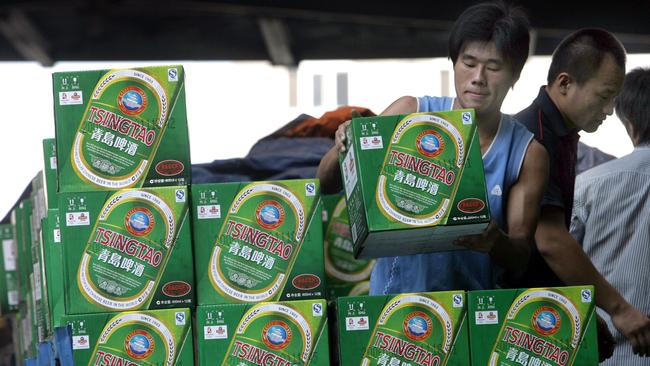Coronavirus: Chinese brewer buyers push back on tariffs
Chinese brewing giants are leading the internal pushback against Beijing’s threats to slap tariffs on Australian barley exports.

Chinese brewing giants are leading the internal pushback against Beijing’s threats to slap tariffs on Australian barley exports, with companies including Tsingtao reliant on imported grain to produce beer and export malt across Asia.
With Australian barley considered superior to that of international competitors, Chinese brewers have been importing hundreds of thousands of tonnes of premium malting barley to produce beer in one of the biggest alcohol markets in the world.
While drought affected Australia’s barley output last year, down to $600m in exports, the overall value of barley trade to China since 2014 is $7.2bn.
The Tsingtao Brewing Company uses about 200,000 tonnes of Australian grain every year, which it describes as “the best quality”. In Qingdao, home of the first brewery in China, Australian barley is regularly used.
At its peak in 2015, the Chinese market accounted for 78 per cent of Australia’s entire barley export market. Australian Export Grains Innovation Centre chief executive Richard Simonaitis said our barley was popular in Chinese malthouses and breweries as it was grown in a dry climate and allowed brewers to add more sugar than usual.
“China loves Australian barley because it is grown in a clean, dry climate. It’s very safe to use and it needs less cleaning than barley from wet countries, which can carry moulds and other contaminants into the malthouse,” he said.
“What’s also great from a Chinese perspective is the quality of the protein, which helps multiply the yeast rapidly, allowing for a rapid fermentation. Chinese beer uses very low levels of malt and uses more sugar or rice syrup; Australian barley allows for efficient conversion of these adjuncts into alcohol in the brewing process.’’
Grain Producers Australia chief executive Andrew Weidemann said the industry had a 40-year history with Chinese brewers and it would hurt the communist nation’s ability to export products across Asia.
“The quality of Australian barley has led to a lot of work being done there,’’ he said. “We have university investment in terms of training in China. It’s going to have a major impact for Chinese partners. What are they going to do for the importation of malt?”
Reports on Tuesday said the China Alcoholic Drinks Association had made a submission to the 18-month anti-dumping barley investigation being run by China’s commerce ministry.
“This would hurt the interests of the beer industry. This might also push up corn prices and increase trade uncertainty,” the group said in its submission.
Chinese authorities have given Australia 10 days to respond to the inquiry, which is due to be finalised by May 19. Trade Minister Simon Birmingham said Australia was prepared to take China to the World Trade Organisation if it put tariffs on barley exports.
The standoff comes amid a month-long war of words between China and Australia over an investigation into the coronavirus outbreak, with Australia vowing to support an EU push for an inquiry at the meeting of the World Health Assembly next week.



To join the conversation, please log in. Don't have an account? Register
Join the conversation, you are commenting as Logout